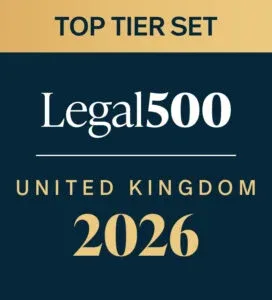Griffiths v TUI (UK) Limited [2021] EWCA Civ 1442 : An initial appraisal
Sebastian Clegg was (first) junior counsel for TUI on the appeals before the Court of Appeal and Martin Spencer J as well as trial counsel.
The Court of Appeal handed down judgment at 11 am today, 7th October 2021, upon the appeal against the judgment Martin Spencer J handed down on 20th August 2020 ([2020] EWHC 2268 (QB)). In the meantime, Martin Spencer J’s judgment has had a significant impact for case management and general decision making in the arena of holiday sickness claims, if not elsewhere. Applications in respect of expert evidence have proliferated including applications by defendants for their own expert evidence or orders for claimants’ experts to be cross examined at trial.
The principal decision of Martin Spencer J was that uncontroverted expert evidence, as he defined it in paragraph 10 of his judgment, had to be accepted by the court provided the court was satisfied that it “fulfils certain minimum standards” (paragraph 33) by “substantially comply[ing] with Practice Direction [35]” (paragraph 35). He stated that “once a report is truly uncontroverted” the role of the court of evaluating the evidence “falls away” (paragraph 35). He held that Professor Pennington’s report was such an “uncontroverted report” and, accordingly, HHJ Truman was not entitled to reject its conclusions and he allowed Mr Griffiths’ appeal against the dismissal of his claim.
It is submitted that the other two main points to pick up from Martin Spencer J’s judgment were:
- His classification of holiday sickness claims into those which claimants may seek to prove by a “qualitative approach” and those which claimants may seek to prove by a “quantitative approach” (see paragraph 21). There has been debate in the courts about precisely what falls within those definitions but it is submitted that the “qualitative approach” involves cases where an expert may have sufficient evidence, for example in the form of stool sample results, which enable that expert to conclude that food provided by a hotel was implicated in the illness when combined with the other evidence and the “quantitative approach” involves cases where the claimant seeks to prove that the food provided by a hotel caused the illness by reason of the numbers of others who had also fallen ill. Martin Spencer J stated, in paragraph 21 of his judgment, that the obiter dicta in paragraphs 29 and 30 of Burnett LJ’s judgment and paragraph 34 of Sir Brian Leveson P’s judgment in Wood v TUI Travel plc [2018] QB 927 was confined to cases where the quantitative approach was deployed.
- In paragraph 31 of his judgment, Martin Spencer J stated that evidence of outbreaks was of less significance in “qualitative cases” whereas “in a quantitative case, [the absence] of evidence [of large numbers of other guests similarly affected] will be fatal to the case’s success”.
It may be said that these two other points were not strictly before Martin Spencer J and so his comments upon them were obiter. Thus, Martin Spencer J deployed obiter dicta to qualify the obiter dicta of two judges sitting in the Court of Appeal.
By a majority (Asplin and Nugee LJJ), the Court of Appeal overturned Martin Spencer J’s principal decision and restored HHJ Truman’s decision. Asplin LJ gave the lead judgment. The principal paragraphs of interest in her judgment with regard to the issue before the Court of Appeal are paragraphs 65 to 67 and 71. If the court is to be satisfied as to the conclusion reached in an expert report or that the evidence is sufficient to enable the claimant to satisfy the burden of proof in relation to causation, some chain of reasoning supporting the conclusion is necessary, even if it is short. The expert and the party for whom he or she has been called are not entitled to require the opposing party to give them an opportunity to make good deficiencies in their evidence. There is nothing which is inherently unfair in seeking to challenge expert evidence in closing submissions and a party may reserve its criticism of an expert report until closing submissions if it chooses to do so. Asplin LJ recognised that it may be a high risk strategy for a party to take that approach rather than the party seeking its own expert evidence or to cross examine the other side’s expert but such a course is not closed off as a matter of principle.
What then of the other two main points from Martin Spencer J’s judgment identified above? In paragraph 15 of her judgment, when discussing HHJ Truman’s judgment, Asplin LJ set out most of paragraphs 29 and 30 of Burnett LJ’s judgment and paragraph 34 of Sir Brian Leveson P’s judgment in Wood v TUI Travel plc (supra). In paragraph 24 of her judgment, Asplin LJ made reference to “what had been styled” as “qualitative” and “quantitative” cases. There was no express approval or disapproval of that said in Wood v TUI Travel plc and there was no endorsement of Martin Spencer J’s distinction or express disapproval of it. There was no necessity for the Court of Appeal to rule on these matters for the purposes of its task.
Bean LJ dissented in the Court of Appeal with what may be described as a strongly-worded judgment. Whilst the Court of Appeal have refused Mr Griffiths’ application for permission to appeal to the Supreme Court, there may yet be another chapter in Mr Griffiths’ case. In the meantime, we shall see how the Court of Appeal’s decision impacts on the case management of and decisions in the cases running through the lower courts.
A copy of the judgment can be found here
Sebastian Clegg
Deans Court Chambers, Manchester
7th October 2021

Also Recently
-
Jonathan Lally represents Rochdale Borough Council securing a closure order against a shop found to be selling illicit tobacco
Jonathan Lally represents Rochdale Borough Council securing a closure order against a shop found to be selling illicit tobacco. This…
Jan 28
-
James Paterson obtains a finding of fundamental dishonesty
James Paterson obtains a finding of fundamental dishonesty in a claim in which the Court adjudicated there was ’no justification’…
Jan 14











